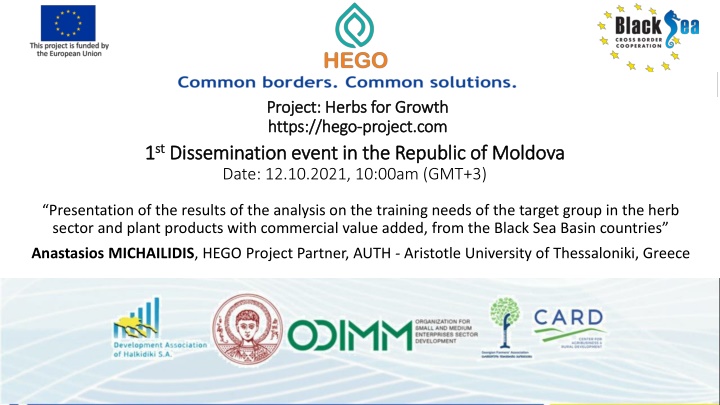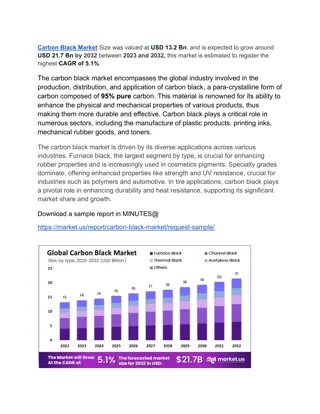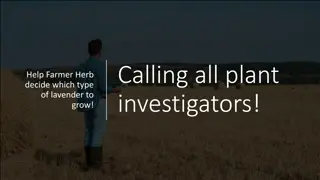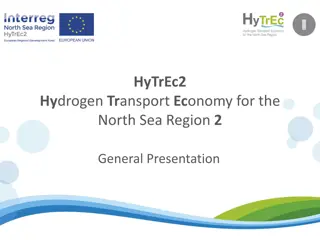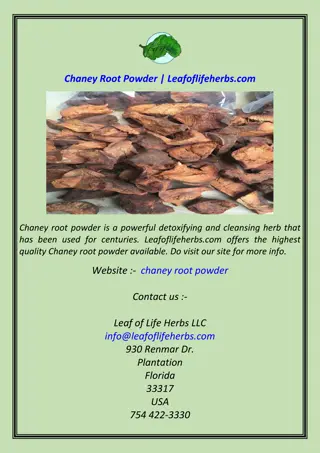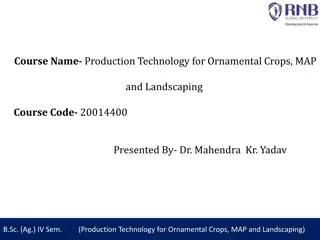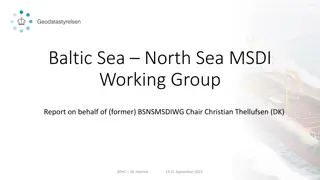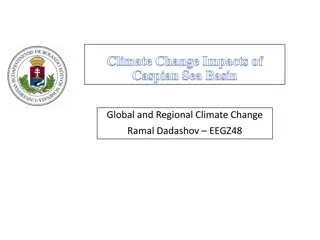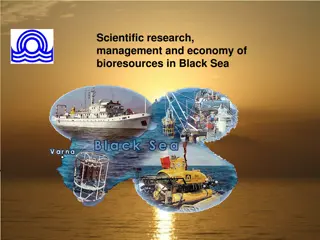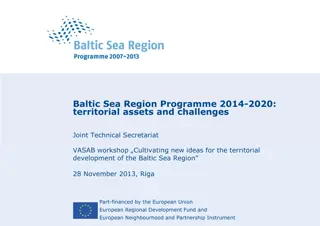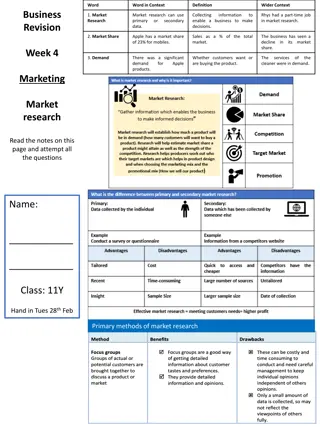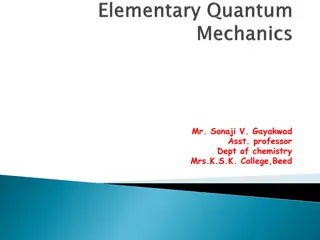Market Research on Herb Sector in Black Sea Region
This project focuses on conducting market research in the herb sector across Black Sea countries to identify training needs, modernization practices, and trade value improvement. The research results aim to provide valuable insights and recommendations for enhancing the herb industry in the region.
Download Presentation

Please find below an Image/Link to download the presentation.
The content on the website is provided AS IS for your information and personal use only. It may not be sold, licensed, or shared on other websites without obtaining consent from the author.If you encounter any issues during the download, it is possible that the publisher has removed the file from their server.
You are allowed to download the files provided on this website for personal or commercial use, subject to the condition that they are used lawfully. All files are the property of their respective owners.
The content on the website is provided AS IS for your information and personal use only. It may not be sold, licensed, or shared on other websites without obtaining consent from the author.
E N D
Presentation Transcript
Project: Herbs for Growth Project: Herbs for Growth https://hego https://hego- -project.com project.com 1 1st st Dissemination event in the Republic of Moldova Dissemination event in the Republic of Moldova Date: 12.10.2021, 10:00am (GMT+3) Presentation of the results of the analysis on the training needs of the target group in the herb sector and plant products with commercial value added, from the Black Sea Basin countries Anastasios MICHAILIDIS, HEGO Project Partner, AUTH - Aristotle University of Thessaloniki, Greece
WP T1 interconnection Analysis of data One in each PP Final compared assesment PP2 M7-M10 M6-M10 M4-M10 Folder with stakeholders list and collection methods One in each PP WP1: Market Research for current situation and training needs on herb sector D.T1.5.1: Final Cross-country Report on Market Research Surveys results Duration: M1-M10 D.T1.4.1: Market Research Surveys Integrated Database M1-M10 Completion of the questionnaire One in each PP D.T1.3.1: Market Research Surveys folder D.T1.2.1: Integrated Survey Protocol and accompanying tools M1-M3 A review on research studies One in each PP D.T1.1.1: Market research studies review material
D.T1.5.1 Activity Title: Activity A.T1.5 - Final reporting on Market Research Surveys Deliverable Title: D.T1.5.1 -Final Cross-country Report on Market Research Surveys results Lead partner: Aristotle University of Thessaloniki (AUTH), PP2 Project countries: Greece, Moldova, Georgia and Armenia
Objective of this research The main aims of this research are: describing the current situation of herb sector, in the Black Sea HEGO countries, identifying the training needs of end-users from several target groups, exploring the adoption of modernization practices and products trade value improvement, providing the final common suggestions/recommendations on training needs among Project countries. findings, conclusions and
Materials and Methods Questionnaire developed by the Greek team and completed in Greece, Moldova, Georgia and Armenia (D.T1.2.1) Face-to-face/personal interviews or interviews by phone, e- mail via Google Forms Collected national data gathered in data excel files (D.T1.4.1) Data analyzed statistically using the SPSS for Windows (ver. 27) by AUTH team (D.T1.5.1)
Description of the sample Distribution of the sample by country Greece (30 questionnaires) Moldova (49 questionnaires) Georgia (33 questionnaires) Armenia (40 questionnaires) 19,74 % 32,24 % 21,71 % 26,32 %
Description of the target groups Target groups Greece (%)Moldova (%) Georgia (%) Armenia (%) 12,50 53,33 20,41 12,12 Farmer of herbs Collector of herbs Local public authorities Regional public authorities National public authorities Sectoral agencies Interest groups including NGOs Education/ training centers and schools SMEs Business support Organisations 6,67 6,67 0,00 3,33 0,00 3,33 13,33 6,67 6,67 0,00 4,08 2,04 4,08 2,04 6,12 8,16 42,86 10,20 27,27 0,00 0,00 3,03 0,00 12,12 9,09 33,33 3,03 15,00 0,00 22,50 0,00 2,50 5,00 5,00 35,00 2,50
Distribution of the total survey sample Farmer of herbs 5.92% 23.03% Collector of herbs 31.58% Local public authorities Regional public authorities National public authorities Sectoral agencies 11.18% Interest groups including NGOs Education/training centers and schools SMEs 2.63% 8.55% 6.58% 6.58% 2.63% 1.32% Business support Organisations
Collection or cultivation of herbs??? The majority of the participants agree that they prefer the cultivation over the collection of the herbs. They agreed that cultivation of herbs protects the endangered species while the collection of herbs threatens the sustainability of the environment. It is worth mentioning that there is an absolute agreement in all countries that cultivation of herbs requires relevant education and training.
Skills and expertise Greece Moldova Georgia Armenia Mean St. Dev. Current level of skills and expertise towards herbs Cultivation practices (planting, irrigation, fertilization, weed harvesting, propagation) Knowledge on cultivation needs (from planting till harvesting) Wildcrafting practices (do you implement these methods of harvesting?) Knowledge on ethical wildcrafting (improve the process, follow regulations and make it more sustainable and environmental- friendly) Knowledge on the biodiversity conservation of endemic herb plant species (do you know that many endemic herb plants are forbidden to harvest as they are protected, red-listed?) Knowledge about sustainable management methods of herb species Processing techniques (drying herbs, herbal mixtures, distillation, extracts, food products etc) Technological expertise (like value chain, precision agriculture, innovations, application of technology in the cycle of production etc) Trading skills (marketing skills, certification etc) Business management skills (value chain development, legislative expertise, finance etc) and pest control, 3.57 3.15 3.00 2.80 3.13 0.33 3.87 3.38 3.15 3.00 3.35 0.38 2.83 2.46 3.58 3.30 3.04 0.50 3.37 2.38 3.61 3.20 3.14 0.53 3.25 0.34 3.47 2.76 3.48 3.30 the ecology and 3.33 0.12 3.37 3.15 3.39 3.40 3.44 0.09 3.50 3.46 3.48 3.30 3.05 0.13 3.13 3.00 3.18 2.90 3.21 0.18 3.03 3.30 3.42 3.10 3.30 0.16 *Mean values 1: none, 5: very high 3.17 3.53 3.21 3.30
Future needs in herbs training Cultivation practices skills 3.77 3.84 Legislative skills 3.84 Processing skills 3.87 Propagation skills 3.90 Environmental ecosystem skills 3.97 Managerial/ commercial skills 3.98 Plant health conditions and weed control skills *Mean values 1: none, 5: very high 1 2 3 4 5
Future training needs for cultivation practices skills On relevant equipment and tools for cultivation and wildcrafting practices On irrigation On fertilizing 3.91 On site selection like soil composition, pH level, drainage On planting process Future training needs for plant health conditions and weed control skills 1 2 3 4 5 4.07 On disease control On pest control On weed control 4.07 On identification of plant health problems 1 2 3 4 5 *Mean values 1: none, 5: very high
Future training needs for propagation skills 3.90 On knowledge of each method characteristics On selection of propagation methods and materials (growing structures, cuttings, seed, separation, division) On establishing and operating an herb nursery 1 2 3 4 5 Future training needs for processing skills 3.99 On drying techniques On distillation techniques On storage/ post-harvest practices On harvesting *Mean values 1: none, 5: very high 1 2 3 4 5
Future training needs for legislative skills On organic certification 3.99 On regulations about certifications On regulations and fines about wildcrafting On dealing with bureaucracy On understanding legislation for products, cultivation, propagations, taxes etc 1 2 3 4 5 Future training needs for environmental ecosystems skills New sustainable wildcrafting practices 3.97 New sustainable cultivation practices Knowledge about the ecology and sustainable management methods of herb species Knowledge about the biodiversity conservation of endemic herb plant species *Mean values 1: none, 5: very high 1 2 3 4 5
Future training needs for managerial/ commercial skills On cooperating internationally (language, trade terminology) 4.10 On evaluating market demand On trading On marketing On technological management On innovation management On business management 1 2 3 4 5 *Mean values 1: none, 5: very high
Most important training needs by country Marketing (Mean value:4.33) Trading (Mean value: 4.30) Cooperating internationally (Mean value: 4.17) Greece Understanding legislation for products, cultivation, propagation, taxes etc (Mean value: 4.38) Regulations about certifications (Mean value: 4.38) Evaluating market demand (Mean value: 4.31) Moldova Disease control (Mean value: 4.39) On site selection like soil composition, pH level, drainage (Mean value: 4.27) On pest control (Mean value: 4.27) On selection of propagation methods and materials (Mean value: 4.27) Georgia Storage/ post-harvest practices (Mean value: 4.15) Identification of plant health problems (Mean value: 4.10) Drying techniques (Mean value: 4.05) Armenia *Mean values 1: none, 5: very high
Efficiency of training methods 4.17 Field demonstrations Practical courses Personalized education 4.10 Descending order On-line communication with an expert scientist Short-term seminars Creating newsgroups Scientific journals On-line courses Information material like brochures Broadcasts on radio Television broadcasts Articles in newspapers 2.83
Conclusions This study helps bring the sector of herbs a step closer to all different target groups participated in the survey and reduce their training gap. The results of this research can be used to design a common training framework for all Project countries, in order to cope with the potential threats of the herb sector. Why? What? How? Training needs
Conclusions Most important knowledge gap wildcrafting practices technological expertise Why is training needed? All responders recognize importance of education/training for herbs cultivation Most important training skills What is needed the most? managerial/ commercial plant health conditions-weed control Major future training needs identification of plant health problems and disease control evaluating market demand How to get the best results? Most efficient training methods field demonstrations practical courses
Conclusions This research identified the most important training needs in each country individually. Another recommendation is that the training programme could be shaped into the needs of each country covering their existed educational gap. High willingness for participation in HEGO conferences, cross-border clusters and follow e-Business Portal.
